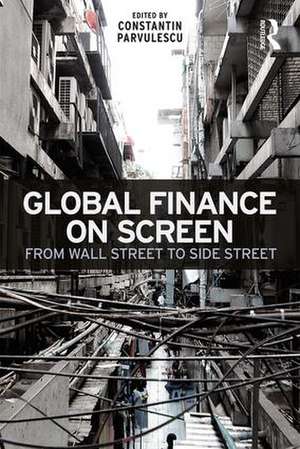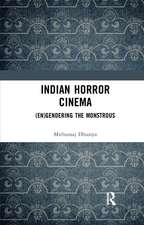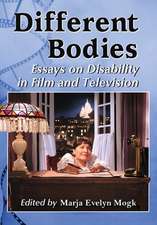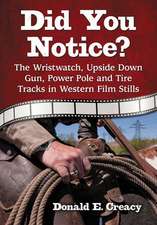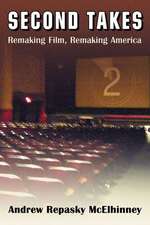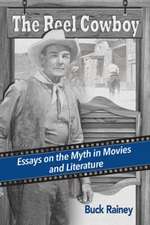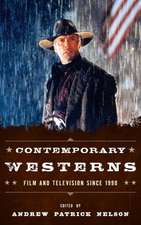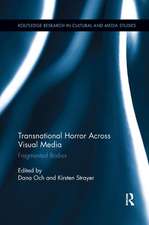Global Finance on Screen: From Wall Street to Side Street
Autor Constantin Parvulescuen Limba Engleză Paperback – 27 dec 2017
The chapters for this interdisciplinary collection are written by European and North American scholars in film studies, anthropology, business ethics, cultural studies, political economy, and sociology. They reveal and evaluate the ability of film to document financial cultures; reflect economic, cultural and political transformations related to financialization; indicate the alienating and exploitative consequences of the growing role played by financial services in the global economy; mobilize social action against finance’s excesses; as well as spread finance and capitalist mythology. The collection offers in-depth investigations of feature films such as Wall Street, Freefall, Margin Call, Justice&Co, The Wolf of Wall Street, and The Big Short, and documentaries such as Inside Job, Capitalism: A Love Story and In a Strange Land.
| Toate formatele și edițiile | Preț | Express |
|---|---|---|
| Paperback (1) | 345.68 lei 6-8 săpt. | |
| Taylor & Francis – 27 dec 2017 | 345.68 lei 6-8 săpt. | |
| Hardback (1) | 764.20 lei 6-8 săpt. | |
| Taylor & Francis – 27 dec 2017 | 764.20 lei 6-8 săpt. |
Preț: 345.68 lei
Nou
Puncte Express: 519
Preț estimativ în valută:
66.15€ • 68.35$ • 55.03£
66.15€ • 68.35$ • 55.03£
Carte tipărită la comandă
Livrare economică 20 martie-03 aprilie
Preluare comenzi: 021 569.72.76
Specificații
ISBN-13: 9781138045286
ISBN-10: 1138045284
Pagini: 256
Ilustrații: 2 Line drawings, black and white; 18 Halftones, black and white; 3 Tables, black and white
Dimensiuni: 156 x 234 x 20 mm
Greutate: 0.36 kg
Ediția:1
Editura: Taylor & Francis
Colecția Routledge
Locul publicării:Oxford, United Kingdom
ISBN-10: 1138045284
Pagini: 256
Ilustrații: 2 Line drawings, black and white; 18 Halftones, black and white; 3 Tables, black and white
Dimensiuni: 156 x 234 x 20 mm
Greutate: 0.36 kg
Ediția:1
Editura: Taylor & Francis
Colecția Routledge
Locul publicării:Oxford, United Kingdom
Public țintă
Postgraduate and UndergraduateCuprins
List of Figures List of Tables List of Boxes Introduction, Constantin Parvulescu Section 1: Telling Finance Stories Chapter 1: Graham Murdock, Narrating Finance Capital: Explorations in Speculation, Crisis and Austerity Chapter 2: Robert Burgoyne, Forms of Time and the Chronotope in the Wall Street Film Chapter 3: Pablo Echart and Pablo Castrillo, Financial Darwinism in Recent American Feature Films Chapter 4: Jens Maesse, "Financial Wisdom" as Discursive Position: How Financial Expertise Is Constructed in Documentary Film Section 2: Critical Interventions Chapter 5: Karen Ho, Finance, Crisis, and Hollywood: Critique and Recuperation of Wall Street in Films about the Great RecessionChapter 6: Constantin Parvulescu, Boiler Room and the Financialization of the American Economy Chapter 7: Scott Loren, Mediating the Crisis: Revisionary Economics in Oliver Stone’s Wall Street Films Chapter 8: Ignacio Ferrero, Marta Rocchi and Robert E. McNulty, No Ethics, No Heroes: How Immorality Flattens Wall Street Characters Section 3: Screening Crisis and Recessions Chapter 9: Daniel Marcus, Documentary Treatments and Cultural Hierarchies: The 2008 Financial Crash in American Documentaries Chapter 10: Elena Oliete-Aldea, Global Financial Crisis in Local Filmic Scenarios: Transnational Cinema of the Great Recession Chapter 11: Araceli Rodríguez Mateos, Precarity and Vulnerability: Documentaries on the Crisis in Spain PostScript: Notes of a Filmmaker Michael Chanan, How to Make a Film about Money and Debt without Any Money and without Falling into Debt AcknowledgementsList of Contributors
Notă biografică
Constantin Parvulescu is research fellow at the Institute for Culture and Society, University of Navarra, Spain and guest lecturer at the University of St Gallen, Switzerland. He is author of Orphans of the East: Postwar Eastern European Cinema and the Revolutionary Subject (2015) and the co-editor of A Companion to the Historical Film (2013).
Recenzii
"The filmic representation of finance is intimately connected to how we understand, analyse and resist financial markets. This wonderful anthology presents a cultural analysis of finance film and documentary from its earliest days to the present, showing our enduring fascination and repulsion of speculation. It offers a detailed reading of the narrative and visual themes of financial representation, and a novel perspective on its politics."
Marieke de Goede, University of Amsterdam, the Netherlands
"This book, the first of its kind, provides a cogent, multifaceted account of the collision of two great dream machines that define our era: film and finance. The first has become our global society's most powerful form of storytelling; none of us can deny the second's extensive and intensive power over almost everything in this interconnected world. In addition to the rigour and diversity of the approaches taken by its authors, what I find especially admirable about this collection is that, by bring film and finance into critical proximity, we come to learn much more about the power and the limits of each. As we struggle today to grasp the nature of global finance before it further destabilizes our precarious world, this book will help us hone our critical imaginations. For this reason I highly recommend it not only to scholars but to film-makers, artists and activists seeking new ways to represent the terrible power of money, and offer the alternative visions we so dearly need."
Max Haiven, Lakeland University, Canada
"The essays in this pioneering and timely book make a major contribution to our understanding of finance on film. The collection discusses how films of all kinds have registered the growing dominance of the financial sector over our political cultures and everyday lives in the years leading up to and after the near-global financial crisis of 2007-2008. Acutely aware of how cinema helps to shape and inform popular opinion and understanding, the writers here argue that recent ‘finance films’ offer us a crucial sphere for reflection on the economic state that we’re in and show us routes to forms of critical intervention in the name of economic and social justice. This collection makes essential reading for anyone concerned with understanding how we have come to explain the contemporary financial sector to ourselves. Global Finance on Screen will be indispensable to anyone wanting to make sense of contemporary capitalism and of the stories we tell about it."
Alasdair King, Queen Mary University of London, UK
"Global Finance on Screen aligns itself with the struggle for an effective critique of financial capitalism across the social sciences and the humanities. The concern-driven approach of this volume assembles research on finance film at a moment in contemporary financial capitalism when filmmakers assume a deliberately critical view on finance. The volume reconstructs and re-interprets these critical social analyses from a wide range of filmic genres and formats, including documentaries, feature and television films and spanning a period of 100 years of filmmaking. The contributions touch upon finance-related issues represented in film that address much broader audiences in cultural economy and the social study of finance, such as the temporalities of finance, orders of economic and financial knowledge, or social-structural polarizations conditioned by finance. The volume is thus powerfully placed as a contribution to economic history from a Cultural Studies perspective, but it articulates also highly nuanced contemporary diagnoses of financialized societies."
Andreas Langenohl, Justus-Liebig-Universität Gießen, Germany
Marieke de Goede, University of Amsterdam, the Netherlands
"This book, the first of its kind, provides a cogent, multifaceted account of the collision of two great dream machines that define our era: film and finance. The first has become our global society's most powerful form of storytelling; none of us can deny the second's extensive and intensive power over almost everything in this interconnected world. In addition to the rigour and diversity of the approaches taken by its authors, what I find especially admirable about this collection is that, by bring film and finance into critical proximity, we come to learn much more about the power and the limits of each. As we struggle today to grasp the nature of global finance before it further destabilizes our precarious world, this book will help us hone our critical imaginations. For this reason I highly recommend it not only to scholars but to film-makers, artists and activists seeking new ways to represent the terrible power of money, and offer the alternative visions we so dearly need."
Max Haiven, Lakeland University, Canada
"The essays in this pioneering and timely book make a major contribution to our understanding of finance on film. The collection discusses how films of all kinds have registered the growing dominance of the financial sector over our political cultures and everyday lives in the years leading up to and after the near-global financial crisis of 2007-2008. Acutely aware of how cinema helps to shape and inform popular opinion and understanding, the writers here argue that recent ‘finance films’ offer us a crucial sphere for reflection on the economic state that we’re in and show us routes to forms of critical intervention in the name of economic and social justice. This collection makes essential reading for anyone concerned with understanding how we have come to explain the contemporary financial sector to ourselves. Global Finance on Screen will be indispensable to anyone wanting to make sense of contemporary capitalism and of the stories we tell about it."
Alasdair King, Queen Mary University of London, UK
"Global Finance on Screen aligns itself with the struggle for an effective critique of financial capitalism across the social sciences and the humanities. The concern-driven approach of this volume assembles research on finance film at a moment in contemporary financial capitalism when filmmakers assume a deliberately critical view on finance. The volume reconstructs and re-interprets these critical social analyses from a wide range of filmic genres and formats, including documentaries, feature and television films and spanning a period of 100 years of filmmaking. The contributions touch upon finance-related issues represented in film that address much broader audiences in cultural economy and the social study of finance, such as the temporalities of finance, orders of economic and financial knowledge, or social-structural polarizations conditioned by finance. The volume is thus powerfully placed as a contribution to economic history from a Cultural Studies perspective, but it articulates also highly nuanced contemporary diagnoses of financialized societies."
Andreas Langenohl, Justus-Liebig-Universität Gießen, Germany
Descriere
Global Finance on Screen offers an insightful exploration of the growing number of popular cinematic and documentary representations of the culture of the financial services to reflect on the value, the relevance and the social impact of this body of work.
